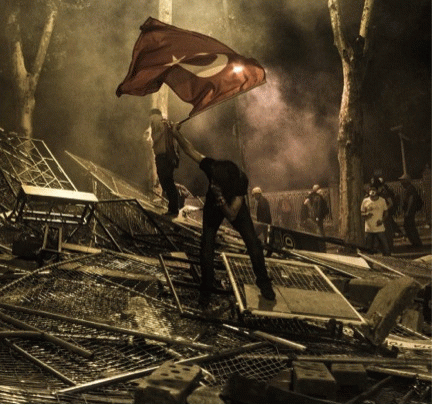(Article changed on January 4, 2014 at 03:05)
The Republic of Turkey is consumed by intense conflict, conspiracy charges, and underlying financial problems that simply won't go away. A perfect storm is brewing in Turkey.
Prime Minister Recep Tayyip Erdogan's government and supporters are charged with a secret gold-for-oil deal with Iran. The deal, in violation of trade sanctions against Iran, enriched the PM's ministers and other key supporters involved (including the PM's son), according to prosecutors. The deal also involved misreporting billions of dollars in trade, which, in turn, resulted in Turkey overstating national income and understating its current account deficit.
A more ominous charge focuses on Erdogan's open support of a wealthy Saudi known for funding al Qaeda and the PM's alleged support of Al Qaeda fighters engaged against the Syrian government. Just today, we say this headline: Turkish governor blocks police search on Syria-bound truck reportedly carrying weapons . Erdogan is a strong supporter of the Syrian rebels, assumed recipients of the weapons.
The crisis started on December 17, 2013 when dozens of Erdogan's close associates were arrested for corruption. The arrests included the CEO of Turkey's state bank caught with million in euros stuffed in shoeboxes. Charges and arrests continued. Prosecutors and police who handled the case were fired at the behest of the Prime Minister. The Turkish supreme court ruled that the government couldn't interfere with police investigations through firings and intimidation. Undeterred, Erdogan fired more prosecutors claiming the charges were an attack on the Turkish state. To top it all off, authorities banned reporters from police stations and pressured the media to stop focusing on the scandals.
Warring Factions
The two warring political factions are within the ruling AKP, which claims to be a moderate, pro business Islamist part. Prime Minister Erdogan's faction is pitted against its former long-term ally, Fethullah Gulen and his Hizmet movement.
Erdogan's rule since 2003 has been marked by an emphasis on economic growth and constitutional reform. Over the past two years, Erdogan has adopted a dictatorial style that involved policies reflecting Islamist principles.
The PM's opponent is Fethullah Gulen who fled Turkey in 1999. He has lived in rural Pennsylvania ever since. Gulen presides over a worldwide network of schools and multimillion-dollar business. His movement claims to promote progress and interfaith understanding. Like Erdogan, Gulen is an advocate of "free market" economic policies. Gulen's initial entry to the United States and his ability to remain a resident has been supported by major figures in the U.S. intelligence community.
Others
The Turkish military has staged a number of coups over the past 50 years. As this crisis emerged, the military announced it did not want to be "involved in political debates." However, just days later, the imprisoned generals from the Ergenekon trials spoke out. They demanded a new hearing, proclaiming their innocence. On January 2, Hurriyet Daily News ran this story, Turkish military asks prosecutors to investigate "plot' claims. According to the story, the convicted generals filed a criminal complaint supposedly against Fethullah Gulen for conspiring to convict them in the Ergenekon trials.
The People's Republican Party (CHP), the Nationalist Party, and other political parties are critical of Erdogan, seemingly intimidated by his charges that they are pawns of the "international conspiracy" Erdogan references so often.
Then, of course, there are the people of Turkey, largest and arguably, the most important faction in this struggle. The people of Turkey have enjoyed a strong economy and low unemployment for through the world recession. The scandals have the potential to seriously impact the Turkish economy, at the expense of the majority of Turks. Their labor formed the basis for economic growth but lacks a voice in determining the outcome of the current crisis.
Risks
Turkey is the southern flank of NATO and a frontline state in the West's regime change effort in Syria. Until 2011, Turkey and Syria had enjoyed a rapidly improving relationship. Then, everything changed. Erdogan faction of the AKP joined the demands of then Secretary of State Hillary Clinton to oust Syria's elected president, Bashar al-Assad. Saudi Arabia provided financial support for rebels and Turkey allowed Istanbul to be used to transship Saudi purchased weapons to Syrian rebels.
Turkey is supposed to be a pillar of the West, stable and reliable. With the burgeoning chaos in government and no-win conflict among warring factions internally, the Obama administration and NATO powers will be tempted to meddle to control the outcome. We all know how well that works out.
(Note: You can view every article as one long page if you sign up as an Advocate Member, or higher).






